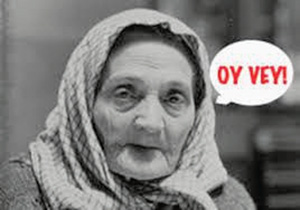
Jewish life is filled with mezuzahs, meshugas and mezinkes. The first ones are usually kissed, the second are rarely missed and the third are joyously danced.
The Mezinke dance is not mentioned in the Torah or Talmud and is not a law, regulation or rule. It is merely a custom created as a tribute to the parents of the bride and/or the groom whenever they are marrying off their last child. The word “Mezinke,” a Yiddish term, literally means “little one” but the dance itself is commonly known as the “broom dance” because it celebrates the parents who are sweeping their last child out of the house. It is not called the “vacuum cleaner dance” because it was invented well before vacuum cleaners and vacuum cleaners inhale and keep things stored inside. In contrast, most Mezinke parents want a clean sweep with no remaining traces. The Mezinke is not called the “mop dance” because parents are not looking to mop the floor with their kids. Like an exhausted and exasperated director of a theatrical production, a Mezinke parent is simply trying to persuade their underlings to exit stage left.
The Mezinke dance typically takes place during the latter portion of a wedding so as not to steal the newlyweds’ thunder. When it is time to Mezinke, the parents are ushered to the center of the dance floor where they sit on chairs like royalty. The actual dance normally involves a bunch of family members, close friends and other hangers-on who march around and/or dance for the honorees while they sit there smiling, waving and milking the moment for everything that it’s worth. The dance usually continues for several minutes until the dancers get bored, the band gets tired, the bride and groom get annoyed and/or the dessert is served.
The exact origins of the Mezinke are not known or at least are not universally agreed upon. Some scholars believe it derives from Ukrainian wedding celebrations during which the parents of the bride and groom were placed on a wagon and paraded to a nearby tavern for some libations and laughs. In those instances, parents who were marrying off their last child were given special treatment. Some experts believe that Jews living in The Ukraine observed, adapted and adopted this tradition into what we now know as the Mezinke dance. (Yes, if this is correct, then you could refer to the Mezinke dance as the Ukrainian Shuffle.)
A divorce certainly is no laughing matter but one might wonder whether a divorce somehow voids the Mezinke ab initio, thus requiring a new Mezinke if and when the divorced child remarries. The answer is unclear but for the record, a divorce certainly does not mean that the parents must sit through a “Reverse Mezinke” wherein the dancers dance around them in the opposite direction. (That would sort of be like when Superman flew the planet and caused it to rotate in the reverse direction, thus turning back time.) In other words, a Mezinke is a precious, joyous moment in time that should not be disturbed. It also should not be overly orchestrated because an arranged Mezinke would almost be as silly as arranged spontaneity.
Another fair question is whether other instances in life deserve a Mezinke-type dance. For example, should a Mezinke dance be done after parents celebrate the bar or bat mitzvah of their last child? Perhaps, but where do we then draw the line? Should a Mezinke be danced after the last child (i) completes potty-training, (ii) finishes little league, (iii) graduates from elementary school, (iv) takes the SAT’s or (v) gets a driver’s license? Such events probably are not Mezinke-worthy but other momentous moments possibly are, like when parents (i) attend their last parent/teacher conference, (ii) check in on their last junior congregation, (iii) drive up for their last camp visiting day, (iv) pay their last tuition bill, (v) drive their last carpool and (vi) confiscate their last iPhone until homework
is completed. Another possibly appropriate moment to dance the Mezinke is when your last child—sincerely and without solicitation or ulterior motive—expresses gratitude and appreciation for everything the parents have done for them. In that moment, a parent can have some semblance of solace that the child may turn out to be a mensch after all.
Final thought: Do not start dancing the Mezinke prematurely, immediately after your last child gets engaged. You must wait until after the actual chuppah ceremony. As they say, “it’s not over until the fat lady sings or… until the fat gentlemen demolishes the smorgasbord.”
By Jon Kranz













